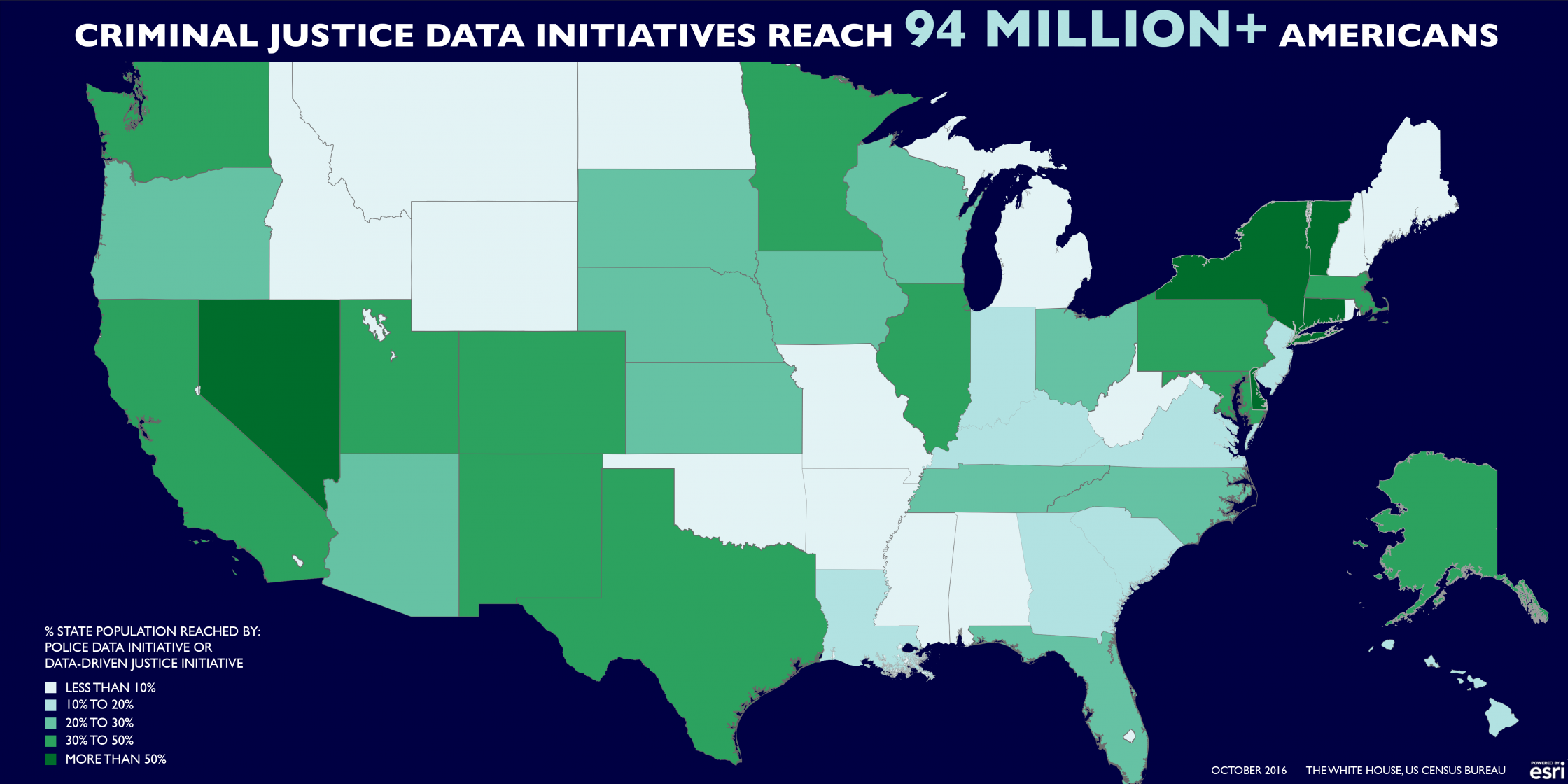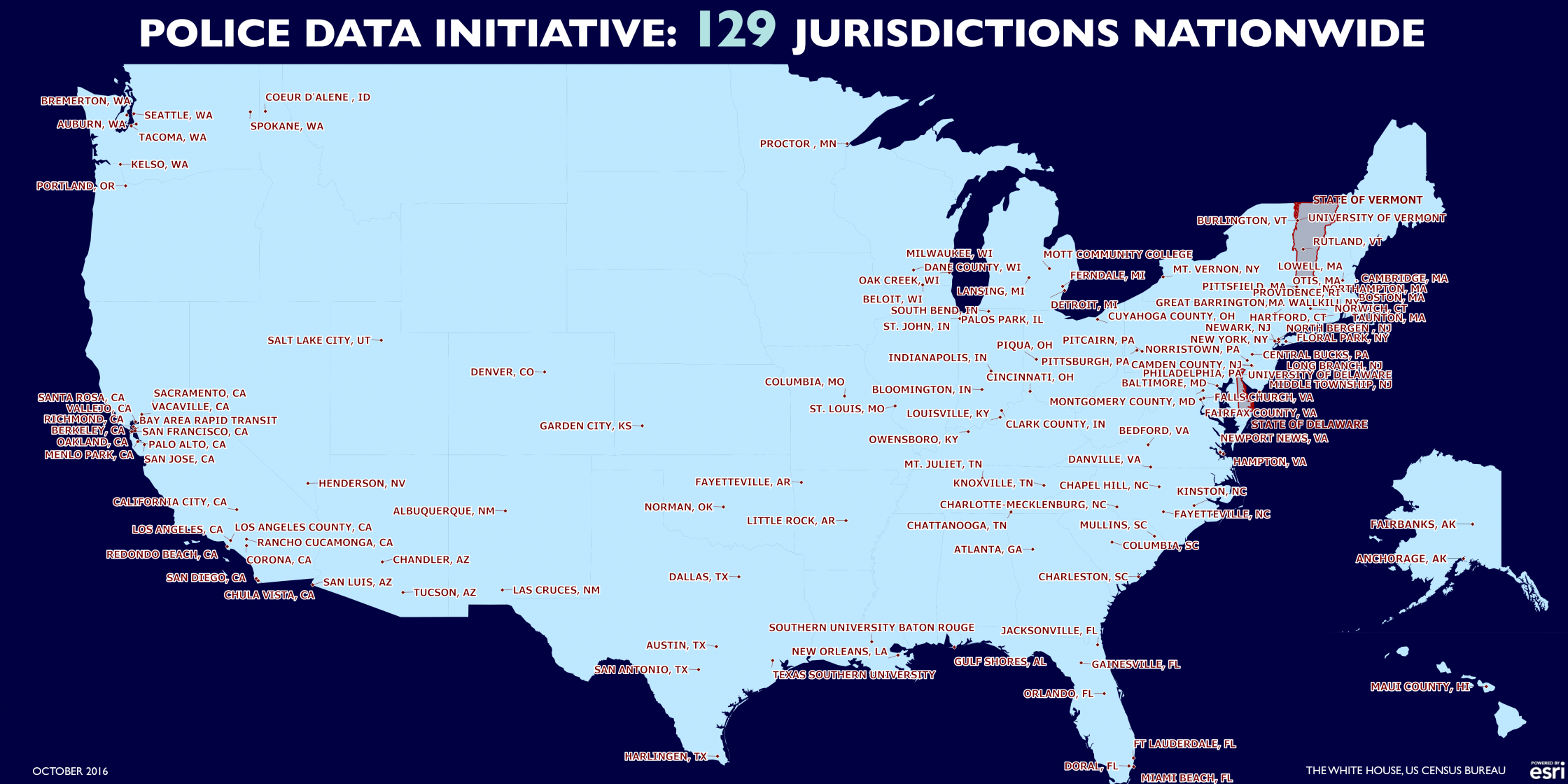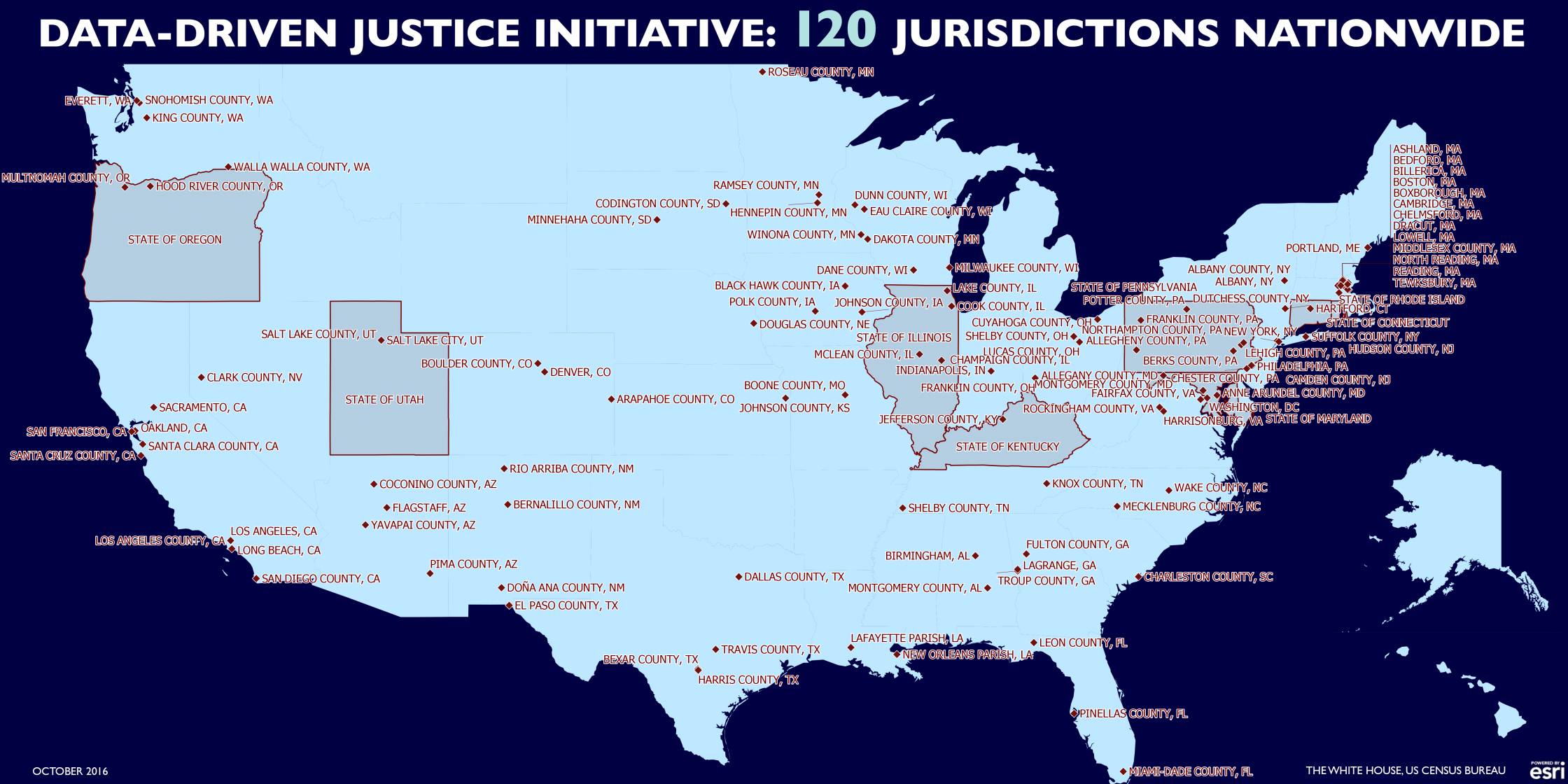
In December of 2014, in response to a number of serious incidents between law enforcement and the communities they serve and protect, the President issued an Executive Order appointing an 11- member Task Force on 21st Century Policing. The President charged the Task Force with identifying best practices and offering concrete recommendations on how policing practices can promote effective crime reduction while building public trust.
In May 2015, this Task Force issued its final report (PDF) which included a series of recommendations for police departments, communities, and governments to consider. Cutting across a number of these recommendations is the recognition that data and technology play vital roles in advancing trust within communities and improving our overall criminal justice system.

Since his first day in office, the President has been a leading voice to ensure that the power of data and technology are used to address the biggest challenges this country faces. And it’s through his leadership that two initiatives have been cultivating local advances in the use of data and technology in policing and the criminal justice system: The Police Data Initiative, announced in May of 2015, and the Data-Driven Justice Initiative, launched in June of this year.
These complementary initiatives each now support more than 100 jurisdictions – communities, counties, and states – and collectively reach over 94 million Americans.
THE POLICE DATA INITIATIVE GROWS TO 129 JURISDICTIONS
The Police Data Initiative (PDI) supports local police department efforts to leverage data to increase transparency and accountability and build trust with their communities. Law enforcement agencies participating in PDI commit to releasing at least three policing datasets to the public. Different from data on crime, these datasets may include data on stops and searches, uses of force, officer involved shootings, or other police actions. To date, these law enforcement agencies have released more than 170 data sets and are in the process of releasing more. Numerous foundations, organizations, and companies have also stepped up to help accelerate progress.
Today, the White House and the Department of Justice are announcing that 76 law enforcement agencies have signed on to PDI since April of this year. This brings the total to 129 law enforcement agencies covering more than 44 million individuals across the country.

Image courtesy of the Police Foundation.
Opening data to the public allows for law enforcement and community members to have authentic conversations about what is happening in their communities and the activities of their local law enforcement.
As Police Chief John Mina of the Orlando Police Department has explained, “The purpose of posting this data is to be transparent and let the public have access to this information. Our citizens will be able to review the information themselves and not have to rely on the media or their narrative and opinion about the incident.”
These conversations are in many ways just beginning. That’s why the Department of Justice is also announcing today that its Community-Oriented Policing Services (COPS) Office will be assuming leadership of the Police Data Initiative moving forward. Jurisdictions around the country are also now able to receive training and technical assistance on how to transform their agency using transparency and open data. And because the collection, use, and public sharing of data is key to organizational transformation and in building trust and legitimacy, the Police Data Initiative is folding into a new category of its Collaborative Reform Initiative.
THE DATA-DRIVEN JUSTICE INITIATIVE GROWS TO 120 JURISDICTIONS
But transparency is just the start. The President also recognizes that some of the country’s most vulnerable people have a disproportionately high number of interactions with police departments and the criminal justice system. Indeed, too often police officers are asked to respond to and work with people with complex social and health issues such as mental illness, substance abuse, and poverty.
That’s why, building off of innovative practices already occurring in San Antonio (TX) and Miami (FL), the President launched the White House Data-Driven Justice Initiative (DDJ) in June 2016 to assist city, county, and state governments committed to using data-driven strategies to divert low-level offenders with mental illness out of the criminal system and to change approaches to pre-trial incarceration so that low risk offenders no longer stay in jail simply because they cannot afford bond.
Today, the White House is announcing that 52 new communities are joining the Data-Driven Justice Initiative. DDJ has now grown to 120 jurisdictions covering over 91 million people.

Image courtesy of the National Association of Counties.
These jurisdictions, as part of signing onto DDJ, have committed to their community three things:
- Combining data across system silos to identify individuals who are at high-risk and finding ways to provide effective, community-based services to help break the cycle of incarceration.
- Developing tools and trainings to help first responders effectively de-escalate crisis situations and safely divert people to the appropriate service providers instead of arresting them;
- Using evidence-based, objective, risk based assessment tools in pre-trial assessments. This will allow individuals who are considered low risk defendants to be safely released from jails;
DDJ jurisdictions participate in regular calls where they share with each other best practices and discuss common challenges. They also gain access to the range of resources committed by technology companies, philanthropies, and non-profit organizations.
In addition, two federal agencies are making commitments to pilot new efforts with DDJ communities: The Department of Veterans Affairs will work with up to three DDJ jurisdictions to pilot efforts to reduce unnecessary criminal justice involvement for Veterans. These pilots will work to build and refine a model for collaboration between local VA health centers, law-enforcement, behavioral health, and treatment services. In addition, through another pilot effort, the Department of Housing and Urban Development will be providing targeted funding and technical assistance to help DDJ communities link data across their criminal justice, health, and homelessness systems to find ways to prevent ER visits, jails, and shelter stays.
Both the Police Data Initiative and the Data-Driven Justice Initiative demonstrate the power of data and technology to catalyze progress against seemingly intractable challenges. But behind each of these initiatives, it is not the data nor the technology that is truly driving change. Only people can do that. And so we extend a thanks and a warm salute to the police chiefs, mayors, sheriffs, county commissioners, and all those on the front line who have taken the steps to pioneer these paths forward.
For more information on these initiatives, including how you can get involved, please visit: whitehouse.gov/policedata and whitehouse.gov/datadrivenjustice.
Ronald L. Davis is the Director of the Office of Community Oriented Policing Services (COPS Office) at the United States Department of Justice.
Roy L. Austin, Jr., is the Deputy Assistant to the President for Urban Affairs, Justice and Opportunity at the White House Domestic Policy Council.
DJ Patil is the Deputy U.S. Chief Technology Officer for Data Policy and Chief Data Scientist at the White House Office of Science and Technology Policy.

